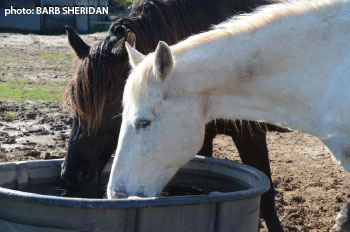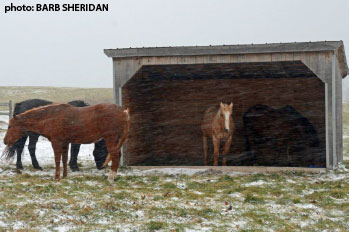ARCHIVE EQUINE NEWS STORIES
| Current news is available at TheHorsePortal.ca, Equine Guelph's online learning platform for practical, quick learning. Given the vast amount of information on horse health and welfare, Equine Guelph has archived its past news articles from 2002-2020. They are listed below, along with a search function available to find specific healthcare topics. | |
Equine Welfare is Everyone’s ResponsibilityJanuary 2014
By Barbara Sheridan
 The plight of the unwanted or neglected horse is a growing welfare issue in this country. Seldom does a week go by without a publicized horse welfare issue in some form of neglect, abuse, or abandonment. With an aim to provide a greater foundation of knowledge regarding the welfare of the horse, this year
The plight of the unwanted or neglected horse is a growing welfare issue in this country. Seldom does a week go by without a publicized horse welfare issue in some form of neglect, abuse, or abandonment. With an aim to provide a greater foundation of knowledge regarding the welfare of the horse, this year
Equine Guelph has launched its latest awareness campaign, “Full-Circle Responsibility.” Through this educational initiative, Equine Guelph’s goal is to assist horse owners to develop the necessary tools and skills to make sound management decisions based on scientific research in order to support the well-being of the horse.
With the current economic climate and changes in the racing sector in Ontario, many in the horse industry have been forced to look for ways to live more frugally. Unfortunately in most cases, it’s the horse that suffers.
“The majority of horse owners and riders have a strong attachment to their horses, and would not purposely go out of their way to neglect a horse,” says Gayle Ecker, Director of Equine Guelph. “But proper equine welfare goes far beyond providing the basics of food and water. It’s about how the horse is managing with the conditions in which it lives. It’s about taking full responsibility for horse ownership right up until the end.”
What is Equine Welfare?
The simple definition of welfare, “quality of life”, can at times be unclear, as this term can mean different things to different people. This is especially true of equine welfare, where breeds vary greatly in their needs. Nonetheless, everyone can agree that providing good welfare to our beloved horses should be based on both physical and mental health.
In the past, society normally regarded equine welfare only as it relates to the animal’s physiology and its environment, such as feeding and shelter. But over the past 15 years, the science of animal welfare has made huge developments in recognizing their needs by expanding the concept of welfare and management issues of the horse to include also their well-being and related tolerable threshold of pain, suffering or neglect.
What’s best for the Horse?
Just last year, Equine Canada and the National Farm Animal Care Council (NFACC) came together to provide horse owners with updated guidelines for general equine management with the release of the new Code of Practice for the Care and Handling of Equines. “The code was developed for both the professional and the individual owner for the health and welfare of horses,” says Jack de Wit, Director with the Equine Canada Board of Directors and Chair of the Code Development Committee.
The Code was established to develop and enforce guidelines for minimum standards for the welfare of the horse. This would include proper nutrition, appropriate shelter, disease prevention and treatment, humane handling, and when necessary, humane euthanasia. Its development was led by an 18-person committee made up of equine owners, caregivers, animal welfare and enforcement representatives, researchers, veterinarians and government representatives. A five-person Scientific Committee, which included researchers with expertise in equine behaviour, health and welfare, also aided in its concept.
Printed copies of The Code of Practice for the Care and Handling of Equines, a 92-page document outlining proper animal care requirements and recommended practices for equine welfare, are available by contacting Equine Canada. The Code can also be viewed or downloaded.
Meanwhile in Ontario, a new organization was formed to contribute to improvements in farm animal care and welfare. Established in January 2012, Farm & Food Care is the first coalition of its type in Canada and resulted from the amalgamation of the Ontario Farm Animal Council (OFAC) and Agricultural Groups Concerned about Resources and Environment (AGCare) in order to bring awareness, appreciation, and information to farmers to help ensure that farm animals are raised in a responsible manner.
“While we do not specifically represent horses at Farm & Food Care, there are many parallels that exist between farm animals,” said Kristen Kelderman, Farm Animal Care Coordinator of Farm & Food Care Ontario based in Guelph, Ontario. “Regardless of whether you are taking care of a cow, horse, pig or chicken, good farm animal welfare should be the same across all species.”
Farm & Food Care offers a Farm Animal Care Helpline to assist farmers with management-type issues such as thin animals or lack of bedding, but is not meant for legitimate abuse or cases where laws have been broken. “We do not take horse calls, because we do not have this agreement on the horse side. When people do call our office about horses, we recommend that they call the OSPCA (Ontario Society for the Prevention of Cruelty to Animals) directly,” states Kelderman. “The Helpline does not have the mandate or resources to respond to the thousands of calls that the OSPCA does, but is simply another tool for people to use when they are concerned for an animal’s welfare.”
Help Prevent Welfare Issues
"Equine welfare is a human responsibility and should extend beyond our farm gates," says Ecker. “While your horses are being properly cared for, what about the neighbour down the street who has fallen on hard times and is unable to afford sufficient hay to feed his horses?” she asks. “Do we turn a blind eye and hope they’ll be alright until the spring? That the problem will fix itself? All of us have a responsibility to take the necessary steps to prevent a horse from suffering. As they can’t speak, we must speak for them.”
 Concern for equine welfare is at its highest. To own and care for a horse should be a privilege, not a pastime. Equine welfare education is one important key to helping overcome limited mindsets, creating a system of accountable, and ultimately preventing inhumane practice.
Concern for equine welfare is at its highest. To own and care for a horse should be a privilege, not a pastime. Equine welfare education is one important key to helping overcome limited mindsets, creating a system of accountable, and ultimately preventing inhumane practice.
For concerns regarding horse welfare such as obvious abuse or neglect, the public is encouraged to call the OSPCA at 1-888-ONT-SPCA (1-888-668-7722). The OSPCA service is available 24 hours a day, seven days a week and all calls are kept confidential. Should the situation be considered a potential safety risk, the public is encouraged to contact their local police or the Ontario Provincial Police.
Sign up for our free e-newsletter which will deliver monthly welfare tips throughout 2014 and announce tools to aid all horse owners in carrying out their “Full-Circle_Responsibility” to our beloved horses.
Visit Equine Guelph’s Welfare Education page for more information.
In partnership with the Ontario Ministry of Agriculture and Food, Equine Guelph is developing a 'Full-Circle-Responsibility' equine welfare educational initiative which stands to benefit the welfare of horses in both the racing and non-racing sectors.
Development of equine welfare training tools is being funded in part through Growing Forward 2, a federal-provincial-territorial initiative. The Agricultural Adaptation Council assists in the delivery of Growing Forward 2 in Ontario. Other partners include: Campbell Centre for the Study of Animal Welfare, Equine Canada, Farm & Food Care Ontario, Greenhawk Harness & Equestrian Supplies, Omega Alpha Equine, Ontario Equestrian Federation, the Ontario Ministry of Agriculture and Food, Ontario Racing Commission, Ontario Society for the Prevention of Cruelty to Animals and Standardbred Canada.